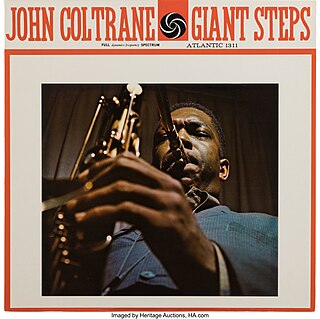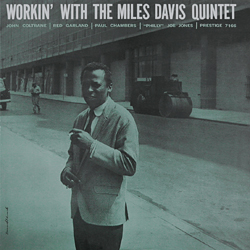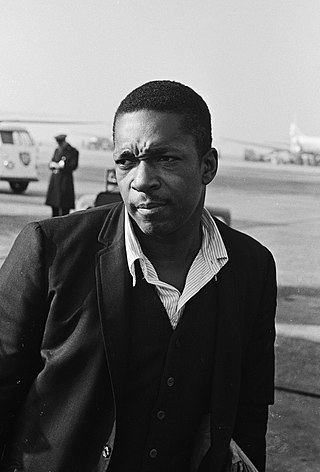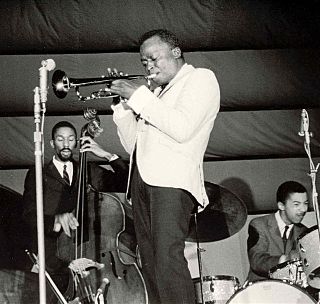Related Research Articles

John William Coltrane was an American jazz saxophonist, bandleader and composer. He is among the most influential and acclaimed figures in the history of jazz and 20th-century music.

Paul Laurence Dunbar Chambers Jr. was an American jazz double bassist. A fixture of rhythm sections during the 1950s and 1960s, he has become one of the most widely-known jazz bassists of the hard bop era. He was also known for his bowed solos. Chambers recorded about a dozen albums as a leader or co-leader, and over 100 more as a sideman, especially as the anchor of trumpeter Miles Davis's "first great quintet" (1955–63) and with pianist Wynton Kelly (1963–68).

William McKinley "Red" Garland Jr. was an American modern jazz pianist. Known for his work as a bandleader and during the 1950s with Miles Davis, Garland helped popularize the block chord style of playing in jazz piano.

James Edward Heath, nicknamed Little Bird, was an American jazz saxophonist, composer, arranger, and big band leader. He was the brother of bassist Percy Heath and drummer Albert Heath.

Giant Steps is a studio album by the jazz musician John Coltrane. It was released in February 1960 through Atlantic Records. This was Coltrane's first album as leader for the label, with which he had signed a new contract the previous year. The record is regarded as one of the most influential jazz albums of all time. Many of its tracks have become practice templates for jazz saxophonists. In 2004, it was one of fifty recordings chosen that year by the Library of Congress to be added to the National Recording Registry. It attained gold record status in 2018, having sold 500,000 copies.

Blue Train is a studio album by the jazz saxophonist and composer John Coltrane. It was released through Blue Note Records in January 1958. It is Coltrane's only session as leader for Blue Note. The recording took place at Rudy Van Gelder's studio on September 15, 1957.

Workin' with the Miles Davis Quintet is an album by the Miles Davis Quintet which was released c. January 1960 through Prestige Records. It was recorded in two sessions on May 11 and October 26, 1956, that produced four albums: this one, Relaxin' with the Miles Davis Quintet, Steamin' with the Miles Davis Quintet and Cookin' with the Miles Davis Quintet.

Someday My Prince Will Come is the seventh studio album by Miles Davis for Columbia Records, catalogue CL 1656 and CS 8456 in stereo, released in 1961. Recorded at Columbia's 30th Street Studio in Manhattan, New York City, it marked the only Miles Davis Quintet studio recording session to feature saxophonist Hank Mobley.

Interstellar Space is a studio album by the American jazz saxophonist John Coltrane, featuring the drummer Rashied Ali. It was recorded in 1967, the year of his death, and released by Impulse! Records in September 1974.

This article presents the discography of the American jazz saxophonist and bandleader John Coltrane (1926–1967).

Coltrane is an album by the American jazz musician John Coltrane which was released in October 1957 by Prestige Records. The recordings took place at the studio of Rudy Van Gelder in Hackensack, New Jersey, and document Coltrane's first session as a leader. It has been reissued at times under the title of The First Trane!.
First Meditations (for quartet) is an album by John Coltrane recorded on September 2, 1965, and posthumously released in 1977. It is a quartet version of a suite Coltrane would record as Meditations two months later with an expanded group. Along with Sun Ship, recorded a week earlier, First Meditations represents the final recordings of Coltrane's classic quartet featuring pianist McCoy Tyner, bassist Jimmy Garrison, and drummer Elvin Jones.

Cattin' with Coltrane and Quinichette is a studio album by jazz musicians John Coltrane and Paul Quinichette released in October 1959 on Prestige Records. It was recorded at the studio of Rudy Van Gelder in Hackensack, New Jersey, and issued two years after the recording sessions took place, and after Coltrane's Prestige contract had ended.

The John Coltrane Quartet Plays is an album by the jazz musician John Coltrane, recorded in February and May 1965, shortly after the release of A Love Supreme.

The Miles Davis Quintet was an American jazz band from 1955 to early 1969 led by Miles Davis. The quintet underwent frequent personnel changes toward its metamorphosis into a different ensemble in 1969. Most references pertain to two distinct and relatively stable bands: the First Great Quintet from 1955 to 1958, and the Second Great Quintet from late 1964 to early 1969, Davis being the only constant throughout.

Calvin "Cal" Massey was an American jazz trumpeter and composer.

This is a timeline documenting events of Jazz in the year 1926.
Vance E. Wilson was an American jazz alto and tenor sax player based in Philadelphia most known for playing lead tenor and alto sax on Clifford Brown's first recording in 1952, The Beginning and the End, as a member of Chris Powell's Five Blue Flames, together with Osie Johnson at a double recording session in Chicago.
Charles R. Rice, better known as Charlie Rice, was an American jazz drummer.
Dewey Bernard Johnson was an American free jazz trumpeter best known for his appearance on John Coltrane's historic recording Ascension.
References
- ↑ "Jimmy Oliver has passed away". 12 February 2005.
- ↑ "In Short" 21 September 1946 Billboard . Retrieved 2 May 2013.
- 1 2 Porter, Lewis (1999) John Coltrane: his life and music, p. 71. University of Michigan Press at Google Books. Retrieved 30 April 2013.
- ↑ Encyclopedia of Jazz Musicians Archived 2013-11-08 at the Wayback Machine Retrieved 30 April 2013.
- ↑ "Legends Keeping Alive The Golden Age Of Jazz" Philly.com. Retrieved 2 May 2013.
- ↑ Feather, Leonard and Gitler, Ira (1999) The Biographical Encyclopedia of Jazz, p. 356. Oxford University Press at Google Books. Retrieved 2 May 2013.
- ↑ Whaley, Preston (2004) Blows Like a Horn: Beat Writing, Jazz, Style, and Markets in the Transformation of U.S. Culture, p. 188. Harvard University Press at Google Books. Retrieved 2 May 2013.
- ↑ "N. Phila. jazz saxophonist Jimmy Oliver" Philly.com. Retrieved 2 May 2013.
- ↑ Porter, Lewis (1999) John Coltrane: his life and music, p. 70. University of Michigan Press at Google Books. Retrieved 30 April 2013.
- ↑ "Biography: Jo Jones" All About Jazz. Retrieved 2 May 2013.